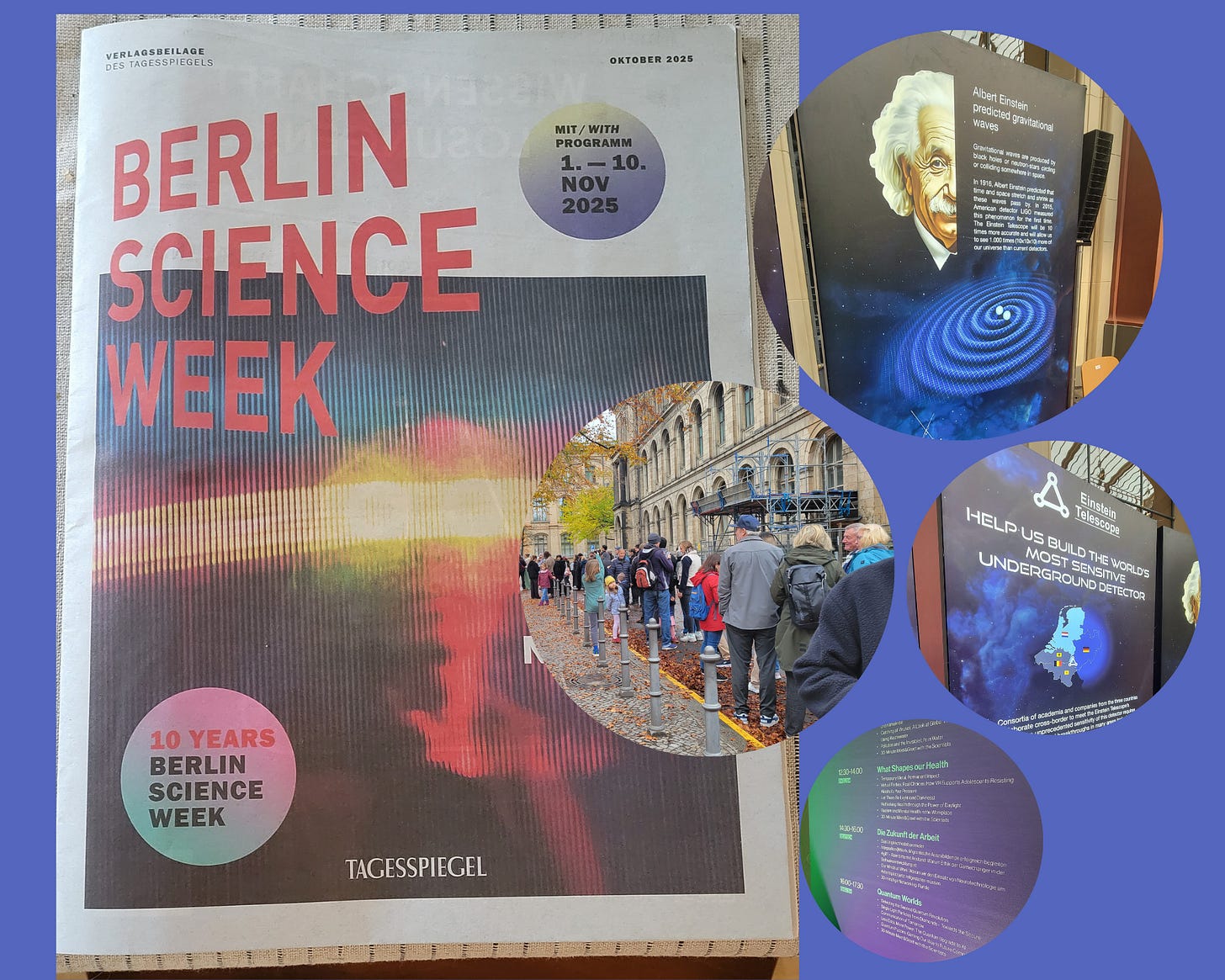Wierd Science + a Travekiez Halloween and LAP Coffee drama
More stories from Berlin

We were at the Museum für Naturkunde (Museum of Natural History) on Sunday for the opening of Berlin Science Week.
At a time when it seems like respect for scientific knowledge and research is increasingly undervalued around the world, it was gratifying to learn about the many different research efforts that are underway in Berlin and across Europe.
The Einstein Telescope, for example, is a cooperative effort by scientists from research institutes across Europe to build an underground gravitational wave observatory. Current plans call for its construction in the border area of northwest Germany, Belgium, and the Netherlands.
On Sunday, visitors could view a VR presentation about gravitational waves and learn more about the project.
I was interested in the research underway at the Alfred Wegener Institute to study the structure of microscopic diatoms as a model for the development of newer lightweight building designs and materials using the ELiSE process.
And, I attended a presentation about the monitoring of wastewater in cities around the world to detect the presence of viruses and viral mutations, often before they are noticed in the human populations.
Scientists with the Max Delbruck Center at the Helmholz Association work with the Berlin water supply company, the Berliner Wasserbetriebe, to monitor the prevalence of coronavirus and other pathogens in the city’s wastewater. Not only does this help inform local public health efforts, but sharing information with other cities and countries helps scientists learn about new viral outbreaks and track how viruses change and spread internationally.
The exhibit stands had information in both German and English, and the speaker presentations were in either language, with some topics available in both languages at different times.
Science Week events continue throughout the week at locations all over the city.
For example, Tuesday’s Pint of Science event at the Ringbar in Neukölln will focus on quantum physics and the potential applications of quantum computing.
On Wednesday, the Zeiss Planetarium will host “Einstein in the Dome: The Universe of Atoms,” a presentation in English by biophysicist Cecelia Clementi about how she uses machine learning to study the structure and function of proteins.
🔬You can find more information and the full program here: Berlin Science Week.
Süß und Sauer
Neighborhood kids cleaned us out of four bags of Halloween candy this year. Thankfully, we were better prepared than we were last year.
Halloween is not a holiday traditionally celebrated in Germany. It is somewhat common in areas of west Germany (and west Berlin) that were under American occupation after World War II.
But we live in a neubau apartment community that has a lot of international families who have imported Halloween. Last year, we had a lot of our neighbors’ young kids come through and barely had enough candy with our two small bags of Haribo from Lidl.
This year, it seems more kids have discovered dressing up and the joys of trick-or-treating. In Germany (where it’s done), the kids say, ‘Süßes oder Saueres!’ Basically, ‘Sweets or (you’ll get something) Sour!’
We enjoyed handing out candy to all of the kids, particularly some of the older ones who still seemed skeptical that they could just knock on a stranger’s door and be given candy. They were very appreciative.
I didn’t take any photos of our host of ghosts, vampires, superheroes, and spooks (German privacy laws), but it was a very fun evening. 🎃
LAP Coffee controversy
Fifteen different locations of the Berlin coffee shop chain LAP Coffee were vandalized with paint overnight on the evening of October 24, allegedly by protestors trying to encourage a boycott of the venture capital-funded company.
(The letters stand for ‘Life Among People’ in case you were also wondering why anyone would want coffee in their lap.)
Critics claim the company has flooded Mitte and Prenzlauer Berg with small storefronts offering cheap take-away coffees at a loss to undercut independent local shops and drive them out of business.
Proponents have said opponents are using “mafia-like” tactics to intimidate a newcomer just hoping to provide inexpensive coffee to go.
Now, The Economist is even covering the issue?
Somebody with LAP is good at PR.
Here’s what else I’m consuming this week.
📘 Reading
If you’re GenX like me, you probably remember the ‘80s English new wave band, Spandau Ballet.
(This was actually my first thought on hearing the name, Spandau, until I moved here.)
The band allegedly took their name from a graffito scrawled on a Berlin bathroom stall referencing the death by hanging of war criminals at Spandau Prison.
According to music journalist Robert Elms, the full quote on the wall was, “Rudolf Heß, all alone, dancing the Spandau Ballet.”
Heß, a high-ranking former deputy to Adolf Hitler, was Spandau Prison’s most famous prisoner—and also its last. He was imprisoned there in 1946 after his conviction at the Nuremberg Trials until he committed suicide by hanging himself in his room in 1987.
Apparently, during the time he was imprisoned, his family members made numerous appeals to have him pardoned. And other supporters tried to get him out by other means.
This update from Kreuzberged: Berlin Companion details one such episode.
📺 Watching
👂 Listening
Andrew and Maurice who write the newsletter 20 Percent Berlin now also have a podcast. Listen to their irreverent, sometimes contradictory takes on Berlin news and current events.




Had no trick or treaters-"trunk or treat" seems to be the thing now. Plus Manchester had the "Scare on the Square event"
Sweet or sour! 👻